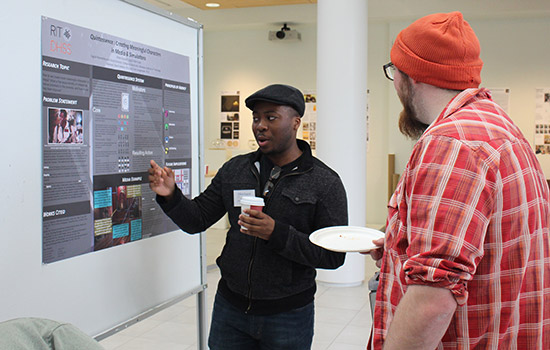Digital humanities research gains national attention
New major has resulted in projects, awards, shows and accolades
Tamar Carroll
Dillon Guscott of Baldwin, N.Y., shows his research, “Quintessence: Creating Meaningful Characters in Media & Simulations” at the College of Liberal Arts Poster Fair. Last month, he was one of the first to receive a bachelor’s degree from RIT’s digital humanities and social sciences program.
In the two years since Rochester Institute of Technology began offering a bachelor’s degree in digital humanities and social sciences, the first two graduates of the program received their degrees, and projects involving students, faculty and alumni connected to the new major are already garnering national attention.
The definition of “digital humanities” can be expansive. It is a broad field that describes the interdisciplinary blending of technology and humanities that includes video game development, data mining and the creation of websites to accompany art displays, and digitally preserving artifacts and literature found in museums and libraries.
Students taking courses in the field will likely be more desirable, as their employers will have graduates who have interdisciplinary experience and a broader understanding about their majors, be it engineering, game development or computer science, for example.
“The DHSS major leaves students well prepared to navigate the rapid changes of today’s workplace, by combining core liberal arts skills including critical thinking, ethical reasoning and written and oral communication with the ability to apply computing and design principles in working with new and emerging technologies,” said Tamar Carroll, assistant professor in the Department of History, who served as director of digital humanities and social sciences from 2015 through this month.
One of the major’s first successes came from Ben Eshleman, who earned a bachelor’s degree in applied arts and sciences this May. He won the Joan Nestle Prize from the American Historical Association’s Committee on Lesbian, Gay, Bisexual & Transgendered History for researching and developing a website, Trans Rochester Speaks, an oral history of activists and advocates in Rochester’s transgender community.
When the prize was announced, the committee noted Eshleman had “divided his project to cover various facets of trans life – activism, work, parenting, health care, community and visibility, allowing a rich coverage of how trans identity shapes one’s relationship with the world. The committee is deeply impressed with Eshleman’s exemplary engagement with primary sources and his impressive synthesis of these narratives into a cogent and highly accessible rendering of trans life in his community.”
Carroll served as faculty supervisor for Eshleman’s project, which was also reviewed in a professional journal.
“This is a great example of undergraduate, interdisciplinary research at RIT that has social impact,” said James Winebrake, dean of RIT’s College of Liberal Arts. “It’s also a great example of how we are combining digital technology, humanities and new media to produce interesting new scholarship.”
Another project that generated headlines was a photo exhibit titled, “‘Whose Streets? Our Streets!’: New York City, 1980-2000,” at the Bronx Documentary Center in New York City, which depicted demonstrations and activism. Josh Meltzer, assistant professor of photojournalism at RIT, designed and developed the multimedia website and is working on a documentary about the project. RIT film student Brittainy Newman of New York City, who will be in her fourth year this fall, interviewed many of the photographers whose work was in the show.
The exhibit was critically acclaimed and was featured in dozens of publications.
Carroll, RIT photo alumnus Meg Handler ’90, and Mike Kamber, founder of the Bronx Documentary Center, were co-curators of the exhibit, which will be on exhibit at RIT’s William Harris Gallery Oct. 5 through Nov. 9, 2018.
One of the first graduates of the major, Everett Kline of Allegany, N.Y., helped develop a mod unit for the popular video game Fallout 4 that simulates a refugee crisis. The game enables the user to develop cognitive empathy as players make decisions about how they react to refugees who are moving into their territory.
He plans to study digital media and English in graduate school and ultimately pursue a postsecondary teaching career.
“Being a student in the DHSS major has been pretty interesting, not only because of the courses and the content of study, but also for being a trailblazer for future students in the major,” Kline said.
All RIT students, regardless of their majors, are required to take liberal arts courses. And RIT was easily able to offer this new major because it had existing programs in humanities, social sciences, information technology, game design and media studies.
“Now we are bringing this all together to educate students on the important role that technology plays in today’s world and what it means to be human and live socially,” said Lisa Hermsen, RIT’s Caroline Werner Gannett Chair of Humanities. “We know employers want students with strong communication and critical thinking skills. Now we’re adding computational skills and the ability to use and work with digital tools.”
Sandy Baldwin, associate professor in RIT’s English department, will become RIT’s DHSS program director on July 1. While the program is still relatively new, it continues to exceed enrollment projections.
“Our students are engaged in cutting-edge research,” he said. “This summer, DHSS students are exploring creative uses of Amazon’s Alexa in our daily lives, and other students are examining challenges and opportunities for teachers in Egypt and Ghana in using digital writing tools.”
Baldwin says core classes offered now include “Ethics in the Digital Era” and “Industrial Origins of the Digital Age,” and students can also take courses in Java coding and new media design.
“No other program in the country offers such a combination of technical skills with exploration into the enduring questions of justice, meaning, expression and history,” he said.














